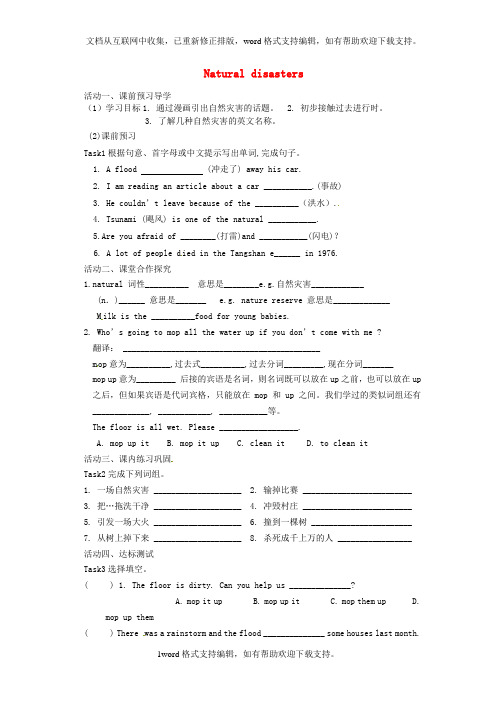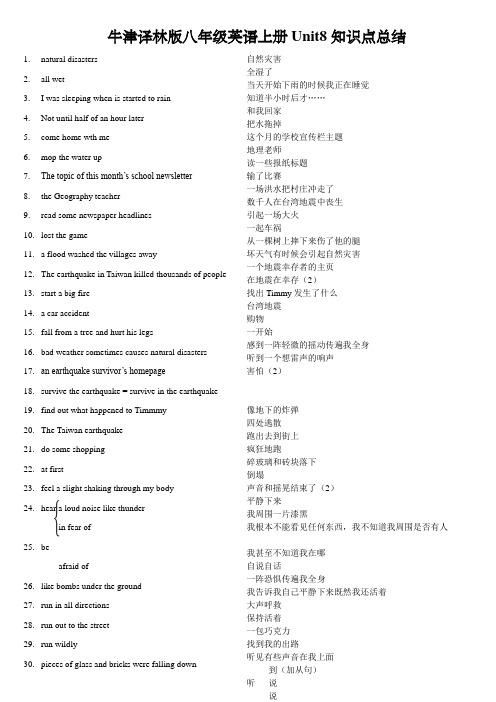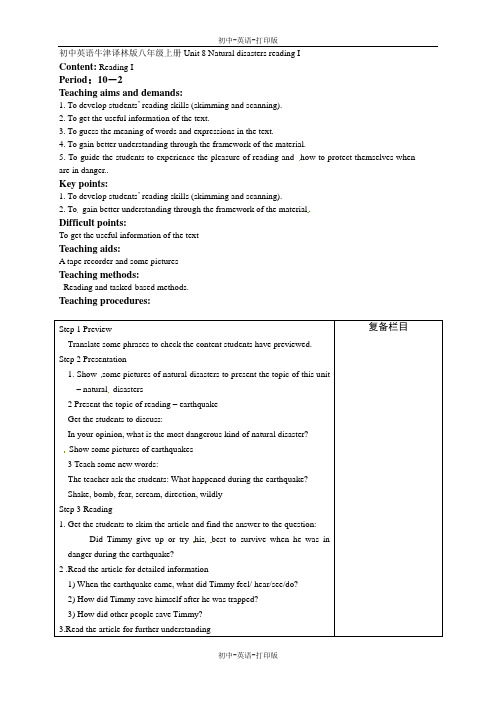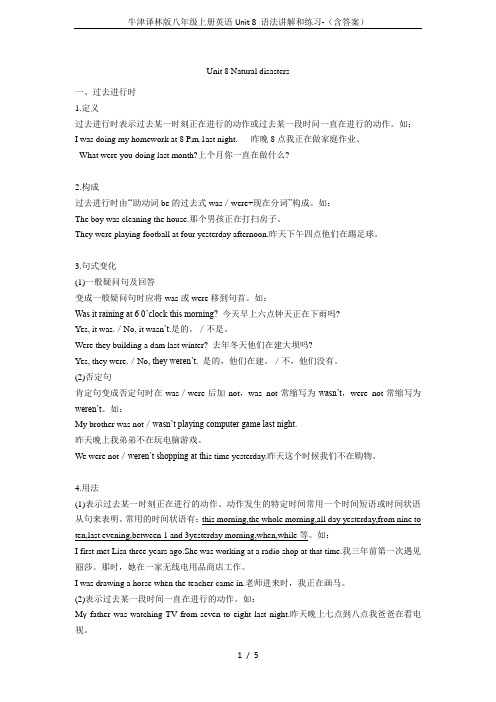江苏省常州市新北区实验中学2019-2020年牛津译林版八年级上Unit8 测试卷(无答案)
译林牛津版八年级英语上册课件:Unit 8 Natural disasters Integrated skills

A: How can we protect ourselves from thick smoke? S: We should use a _________ wet towel to cover our mouth and nose and stay ______ low to the ground. A: Well, what should we do when there’s a flood? high ground S: We should get to ____________. walk Remember that we shouldn’t _______ through the flood water.
Watch and discuss
2
Watch and discuss
3
Discuss What phone number to dial for help
110-Police 119-Fire 120-Hospital 122-Traffic
4
Pair work
eg: A: Look, the building is on fire! B: Don’t worry about that. Let’s dial ____ 119 for help.
• After listening: Think & Check
Danger
Fires
Tips
Try to get out as soon as possible. Cover your mouth and nose with a wet towel to protect yourself from ____________. thick smoke Stay _____ low to the ground. Never ________ go back into the building on fire.
牛津译林版八年级上册Unit8课件

2020/12/1
2
mop up the water
2020/12/1
3
Read their conversation and answer the questions.
1.What happens to Hobo? His house is all wet.
It happened at night.
2020/12/1
23
1. wake up 醒来
wake sb. up 叫醒某人
2. mop up 拖干,把......拖干
3. thousands of 成千上万的4. a car accident 一场车
祸
5. crash into 猛撞,碰撞 6. wash away 冲走
2020/12/1
30
1. Read the text book and learn the new words and phrases by heart.
2. Do the exercises in the workbook.
Байду номын сангаас
2020/12/1
31
谢谢观赏
1. 自然灾害 natural disasters 2. 半个小时以后 half an hour later 3. 把所有的水拖干净mop up all the water 4. 输了比赛 lose the game 5. 成千上万的人 thousands of people
2020/12/1
29
6. 一场车祸 a car accident 7. 撞上一棵树 crash into a tree 8. 把村庄冲走 wash away the village 9. 燃起了一场大火 start a big fire 10. 从树上掉下来 fall from a tree
2020牛津译林版八年级上册Unit8NaturaldisastersWelcometotheUni

Natural disasters活动一、课前预习导学(1)学习目标1. 通过漫画引出自然灾害的话题。
2. 初步接触过去进行时。
3. 了解几种自然灾害的英文名称。
(2)课前预习Task1根据句意、首字母或中文提示写出单词,完成句子。
1. A flood (冲走了) away his car.2. I am reading an article about a car ___________.(事故)3. He could n’t leave because of the __________(洪水).4. Tsunami (飓风) is one of the natural ___________.5.Are you afraid of ________(打雷)and ___________(闪电)?6. A lot of people d ied in the Tangshan e______ in 1976.活动二、课堂合作探究1.natural 词性__________ 意思是________e.g.自然灾害____________(n.)______ 意思是_______ e.g. nature reserve 意思是_____________ M ilk is the __________food for young babies.2. Who’s going to mop all the water up if you don’t come with me ?翻译: _____________________________________________m op意为__________,过去式__________,过去分词_________,现在分词_______mop up意为_________ 后接的宾语是名词,则名词既可以放在up之前,也可以放在up 之后,但如果宾语是代词宾格,只能放在mop和up之间。
牛津译林版八年级英语上册Unit 8 课件

Make the list !
Where did it happen? Introduction
When did it happen?
Where were you?
During the Disaster/ accident
What did you do? What did you hear? What did you see? What happened?
Millie’s house at Millie’s home noise of traffic people removed the snow It was terrible
Write the introduction part
Where did it happen?
Introduction
When did it happen?
I stayed at Millie’s home that night. I heard the noise of traffic the next morning. I looked out of the window and saw that people were working hard to remove the snow.
Snow
umbrella, peopalk
Suddenly, a strong wind came from behind .We lost our umbrella in the wind and I nearly fell over. We had to__w_a_l_k__ slowly in the storm. When we arrived at the bus stop, we could see many people . At last, we got on a bus and went to Millie’s house.
牛津译林版八年级英语上册Unit8知识点总结

146.look for a video about earthquakes
147.The video shows the terrible situation after the earthquake
148.help people get out from under all the stones and bricks
35.I counld not see anything at all and I did not know if
anyone was around me
36.I did not even know where I was
37.say to oneself
38.A moment of fear went though my mind
57.Timmy was trapped in a dark place
58.have nothing to eat
59.look at the weather forecast on the Internet
60.the weather today = today’s weather
61.be around 7℃
111.bad weather can be dangerous
112.e-mail me soon
113.Tell your partner about a natural disaster you heard about
from your online friend
114.hear about
115.a heavy storm with thunder and lightning
17.an earthquake survivor’s homepage
牛津译林版-英语-八上-8单元 Natural disasters reading I

初中英语牛津译林版八年级上册Unit 8 Natural disasters reading IContent:Reading IPeriod:10-2Teaching aims and demands:1. To develop students’ reading skills (skimming and scanning).2. To get the useful information of the text.3. To guess the meaning of words and expressions in the text.4. To gain better understanding through the framework of the material.5. To guide the students to experience the pleasure of reading and how to protect themselves when are in danger..Key points:1. To develop students’ reading skills (skimming and scanning).2. To gain better understanding through the framework of the material.Difficult points:To get the useful information of the textTeaching aids:A tape recorder and some picturesTeaching methods:Reading and tasked-based methods.Teaching procedures:复备栏目Step 1 PreviewTranslate some phrases to check the content students have previewed.Step 2 Presentation1. Show some pictures of natural disasters to present the topic of this unit– natural disasters2 Present the topic of reading – earthquakeGet the students to discuss:In your opinion, what is the most dangerous kind of natural disaster?Show some pictures of earthquakes3 Teach some new words:The teacher ask the students: What happened during the earthquake?Shake, bomb, fear, scream, direction, wildlyStep 3 Reading1. Get the students to skim the article and find the answer to the question:Did Timmy give up or try his best to survive when he was indanger during the earthquake?2 .Read the article for detailed information1) When the earthquake came, what did Timmy feel/ hear/see/do?2) How did Timmy save himself after he was trapped?3) How did other people save Timmy?3.Read the article for further understanding1) Listen to the tape and finish Exercises C, textbook Page 972) Read with feelings and finish Exercises D, textbook Page 97Step 4 PracticePlay the tape for the students to listen and repeat. Then get the students to read the article loudly.Ask the stud ents to discuss : How to save yourselves when you are in danger?Step 5 HomeworkThink of ways of saving yourself during other natural disasters, write them down .Do the exercises in Part B, Page 96.Try to say something about the main idea of the article.教学反思:达标检测Unit 6 Reading I (40’)一、词组翻译(10’)1.在一个购物中心_____________________________2.恐惧地互相看着______________________________3.破碎玻璃片_________________________________4.一阵恐惧___________________________________5.吃一包巧克力_______________________________6.a sligh t shaking _______________________________7.run in all directing ____________________________8.clam down __________________________________9.shout for help ________________________________10. stay here for a long time _________________________二、根据中文完成句子(15’)1.他们告诉自己镇静下来。
牛津译林版八年级上册英语Unit 8 语法讲解和练习-(含答案)

Unit 8 Natural disasters一、过去进行时1.定义过去进行时表示过去某一时刻正在进行的动作或过去某一段时问一直在进行的动作。
如:I was doing my homework at 8 P.m.1ast night. 昨晚8点我正在做家庭作业。
What were you doing last month?上个月你一直在做什么?2.构成过去进行时由‘‘助动词be的过去式was/were+现在分词”构成。
如:The boy was cleaning the house.那个男孩正在打扫房子。
They were playing football at four yesterday afternoon.昨天下午四点他们在踢足球。
3.句式变化(1)一般疑问句及回答变成一般疑问句时应将was或were移到句首。
如:Was it raining at 6 0’clock this morning? 今天早上六点钟天正在下雨吗?Yes, it was./No, it wasn’t.是的。
/不是。
Were they building a dam last winter? 去年冬天他们在建大坝吗?Yes, they were./No, they weren’t. 是的,他们在建。
/不,他们没有。
(2)否定句肯定句变成否定句时在was/were后加not,was not常缩写为wasn’t,were not常缩写为weren’t。
如:My brother was not/wasn’t playing computer game last night.昨天晚上我弟弟不在玩电脑游戏。
We were not/weren’t shopping at th is time yesterday.昨天这个时候我们不在购物。
4.用法(1)表示过去某一时刻正在进行的动作。
动作发生的特定时间常用一个时间短语或时间状语从句来表明。
新牛津译林版八年级英语上Unit 8 Integrated skills教学课件

Millie: We may burn our hands when we cook at home. Do you know what to do first if I burn myself? Daniel: Sure. First, you should keep your hand in cold water for about ten minutes. Millie: I see. What should I do after that? Daniel: Cover the burn with a clean towel. Millie: Should I put any cream on it? Daniel: No, you shouldn't. You should go and see the doctor. Millie: All right. Thanks.
A2 The students are attending a talk called “Away from danger” at Sunshine Hall. Listen to the talk and help Simon complete his notes. It is important to know how to protect
110-Police
120-Hospital
119-Fire
122-Traffic
119-Fire ————ce
- 1、下载文档前请自行甄别文档内容的完整性,平台不提供额外的编辑、内容补充、找答案等附加服务。
- 2、"仅部分预览"的文档,不可在线预览部分如存在完整性等问题,可反馈申请退款(可完整预览的文档不适用该条件!)。
- 3、如文档侵犯您的权益,请联系客服反馈,我们会尽快为您处理(人工客服工作时间:9:00-18:30)。
8A Unit 8单元测试卷班级姓名___________一、听力部分(共20小题,每小题1分,共20分)听读空间U8单元检测二、单项选择题(本题共12小题, 每题1分,共12分)( ) 1. ______ a winter morning, my father fell ______ his bike _____ the ground.A. In; from; toB. At; down; toC. During; out; onD. On; off; onto( ) 2. If you _________, I will ___________ myself.A. don’t come; mop up itB. won’t come; mop up itC. don’t come; mop it upD. won’t come; mop it up( ) 3. ---__________ will the concert begin? ---________ seven o’clock.A How long; Not until B. How long; UntilC. How soon; Not untilD. How soon; Until( ) 4. I _______ in the kitchen yesterday evening when the telephone ______A. cooked; was ringingB. cooked; rangC. was cooking; rangD. was cooking; was ringing( ) 5. _________ you are so tired, you’d better have a good rest.A. SinceB. BeforeC. AfterD. So( ) 6. Jim _________ on the computer when his father returned home.A. worksB. workedC. was workingD. is working( ) 7 --- Do you know if Tom _________ fishing the afternoon?--- I’m not sure. But if he ________ go, I won’t go, either.A. goes, won’tB. goes, doesn’tC. will go, doesn’tD. will go, won’t( ) 8. When the bus stopped, some people ______the bus and some others ______A. got off; got on itB. got off; got it onC. got it off; got on itD. got it off; got it on( ) 9. He didn’t go climbing the hill ___________ the heavy rain.A. becauseB. because ofC. soD. 不填( ) 10. The rain was so _________ that the climbers had to walk __________A. heavy; slowB. heavily; slowlyC. heavy; slowlyD. heavily; slow( ) 11. They __________ in the snow when a boy ___________.A. played; was falling downB. were playing; fell overC. are playing; fall downD. played; was falling down( ) 12. A moment of __________ went through her mind and she couldn’t wait _________ others about the good news.A. fear; forB. fear; to tellC. joy; to tellD. happy; for telling三、完形填空(本题共12小题,每小题1分,共12分)阅读下面短文,掌握其大意,然后从所给的四个选项中,选出一个最佳答案。
Carson was having dinner with his mother and sisters one evening. Suddenly his younger sister asked, “ 1 does it look like that outside?” Everyone looked out of the window on the north side of the kitchen. They saw the sun in a blue sky. Then, they looked out of the window on the south side of the kitchen. They saw a dark sky 2 big,grey clouds. Next,they heard the tornado siren(龙卷风报警).That meant a tornado was coming. They all knew that during a tornado,the 3 place to be is underground. 4 , they had a basement (地下室).They all ran quickly into the basement. Suddenly, Carson remembered the pet cat, Pete. "Mum, we 5 Pete!” Carson yelled, “ I will go upstairsand find him!” But his mother said, “ 6 , Carson! It’s too dangerous. The tornado is coming, you ha ve to stay down here.” All at once they 7 the very loud noise of a very strong wind. It was 8 loud that although they were screaming, they could not even hear their own screams. Everyone was very scared.Just 9 seconds later,it was finished. The tornado went away and everyone was safe. Carson ran upstairs and found that the house was 10 damaged and Pete was gone. He began to cry and went outside. He saw that all the trees were knocked down 11 one. And at the top of the tree, there was Pete, looking at Carson and waiting for him to help him 12 .( ) 1. A. How B. What C. Why D. Where( ) 2. A. with B. have C. has D. having( ) 3. A. safe B. safely C. safest D. safety( ) 4. A. Lucky B. luck C. luckily D. Unluckily( ) 5. A. forgot B. left C. leave D. forget( ) 6. A. Sure B. All right C. Yes D. No( ) 7. A. heard about B. heard C. listened to D. listened( ) 8. A. very B. such C. too D. so( ) 9. A. a few of B. a little of C. a few D. a little( ) 10. A. bad B. badly C. worse D. worst( ) 11. A. except B. besides C. expect D. beside( ) 12. A. away B. off C. up D. down四、阅读理解。
从每题所给的四个选项中选出最佳答案。
(本题共15小题,每小题1分,共15分)AKim Bogue, a keeper in California, worked overtime to save money for a trip to Thailand to visit her family and friends. She saved over 900 dollars and was planning to buy a ticket but she lost her purse with all her money and credit cards.Kim looked through the garbage and all the buildings where she worked but came up empty-handed. She went home heartbroken. She believed that she had lost her money forever. While Kim was at home, sad and depressed, a homeless man was searching through the garbage looking for things to sell. As he was looking through a garbage bag, he found something wrapped in a plastic bag.The homeless man, who did not want to be identified, took the purse to Sherry Wesley, because Sherry Wesley knew him from her volunteer work at a homeless shelter. The homeless man came to Sherry Wesley with the wad of money and said, “This probably belongs to someone that you work with, can you find the owner?”Sherry Wesley works in one of the buildings that Kim cleans and she knew Kim had lost her purse.Kim was amazed when she heard the good news. “I couldn’t believe it when they called me,” she said.“He has a very big heart. If someone else had found the purse, the money would be gone. ”As a reward, Kim gave the man 100 dollars. The homeless man gave half of the money to Sherry Wesley and asked her to donate it to charity for him.( ) 1. Kim worked overtime to save money for her family and friends in Thailand.A. helpingB. visitingC. GivingD. saving( ) 2. While Kim was at home, sad and depressed, a homeless man found _________by accident.A. the garbage bagB. something to sellC. the purse Kim lostD. nothing important( )3. From paragraph 3, Sherry Wesley was a who worked at a homeless shelter.A. volunteer workerB. homeless manC. building cleanerD. blindness( )4. At the end of the story, the homeless man gave _____dollars to charity.A. 900B. 100C. 50D. 80( ) 5. The sentence in the last paragraph “He has a very big heart.” Means __________in Chinese.A. 他很贪心B.他有野心C. 他很高尚D. 他心胸宽广BT he word “day” has two meanings. When we talk about the number of days in a year, we are using “day” to mean 24 hours. But when we talk about day and night, we are using “day” to mean the time between sunrise and sunset. Since the earth looks like a ball, t he sun can shine on only half of it at a time. Always one half of the earth is having day and the other half night. A place is moved from day into night and from night into day over and over by the spinning(旋转)of the earth. At the equator(赤道)day and night are sometimes the same length(长度). They are each twelve hours long. The sun rises at 6 o’clock in the morning and sets at 6 o’clock in the evening. For six months the North Pole(北极)is tilted (倾斜)toward the sun. In those months the Northern Hemisphere(半球)gets more hours of sunlight than the Southern Hemisphere(半球). Days are longer than nights. South of the equator nights are longer than days. For the other six months the North Pole is tilted away from the sun. Then the Southern Hemisphere gets more sunlight. Days are longer than nights. North of the equator nights are longer than days. Winter is the season of long nights. Summer is the season of long days.( ) 6. When the Western Hemisphere is having day, the Eastern Hemisphere is having ________.A. both day and nighB. dayC. neither(既不)day nor nightD. night( ) 7. A place is moved from day into night and from night into day over and over by ________ of the earth.A. the pushingB. the pullingC. the spinningD. the passing ( ) 8. At the equator day is as long as night ________.A. sometimesB. neverC. usuallyD. always( ) 9. When the North Pole is tilted toward the sun, the Northern Hemisphere gets ________ sunlight.A. lessB. moreC. allD. no( ) 10. When it is winter in China, ________.A. the USA is tilted toward the sunB. the South Pole is tilted away from the sunC. the North Pole is tilted toward the sunD. the North Pole is tilted away from the sunCWe use the Internet for many things: business, shopping, writing letters, talking to people, finding information and so on. In recent years, a new kind of English has grown on the Internet. There's no real word for it yet, so we'll call it e-talk.People don't like typing too much. To save time, they turn phrases into a few letters (called acronyms). Acronyms are often used in chat rooms(聊天室). Some of them are: BTW (by the way) BRB (be right back)LOL (laughing out loud) IMO (in my opinion)People also use many abbreviations. They are shortened forms of words. Some common abbreviations are:info (information) puter (computer)pic (picture) sec (second)We usually don't see people when we communicate(交流)on the Net, so people have new ways to show feelings. Most people use their keyboards to draw "feelings", such as::-) (happy) ;-) (joking) :-( (sad) :-O (surprised)These days, many forums (论坛) have picture feelings. For example:(happy) (sad) (angry) (cool) There are even whole new words, like "newbies"(someone who is new on a chat board or forum). When you write something bad about someone else, it's called "flaming" the person.It takes time for people to get used to(适应) e-talk. Also, different groups on the Net have their own special ways of communicating. Newbies sometimes have to ask other people what they mean. As the Internet grows, e-talk will continue to grow and change. ( ) 11. Why do people type acronyms?A. To show their feelings.B. To make jokes.C. Because people can type them quickly.D. In this way newbies won't understand them.( ) 12. What does, BTW, my puter is not working well. :-( mean?A. The person is happy about getting a new computer.B. The person has to go away from their computer.C. The person is angry at somebody.D. The person is sad that his computer is having problems.( )13. If someone is angry, what may he type?A. B. C. LOL D. BRB.( ) 14 E-talk will probably____________.A. keep changingB. stay the sameC. be used by people on the telephoneD. be easy for newbies to understand ( ) 15. The best title for this passage is________.A. E-talkB. Picture FeelingsC. How to Use AbbreviationsD. The Changing Internet五、任务型阅读。
